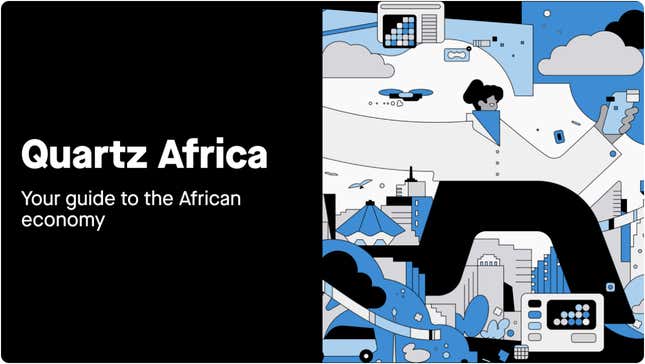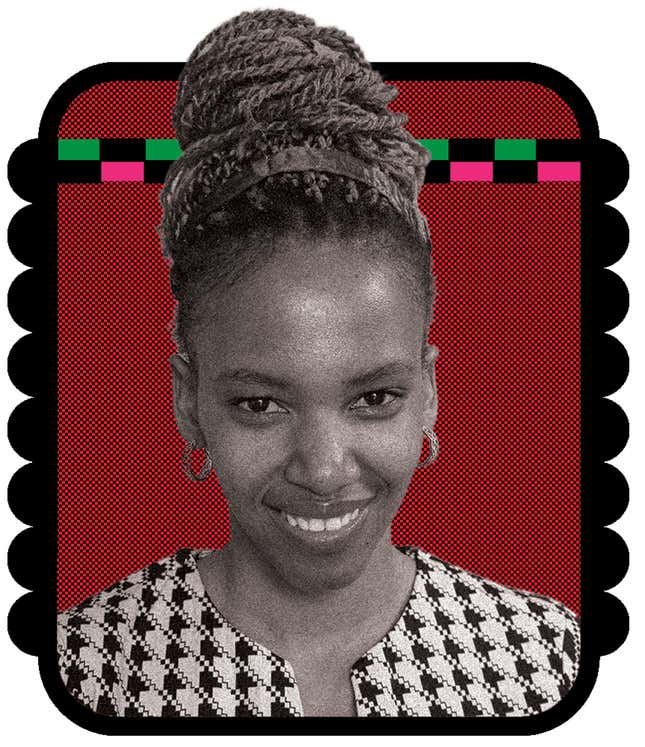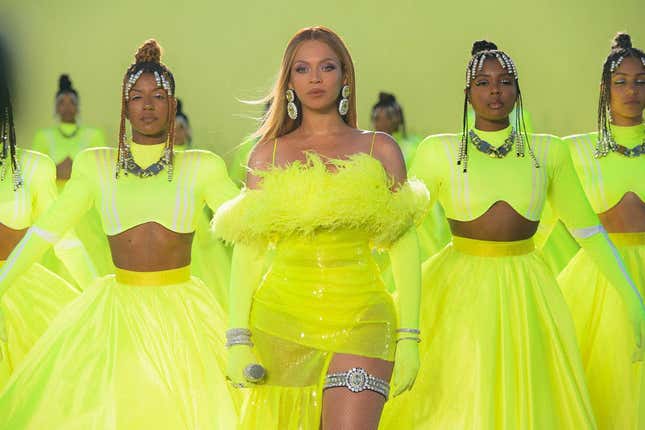Hi Quartz Africa readers,
The overarching message at the US-Africa business summit that took place last week in Marrakech, Morocco, was on the need for improved infrastructure, public-private partnerships, opening of borders, and the changing of mindsets to make business better between the US and Africa.
But while the US delegation was clear on the kind of trade it wants to conduct with Africa, there was a lack of cohesiveness in African leaders’ plans to tap into US markets. Around 450 American companies were present, but only five African government delegations were there to meet them—Morocco, Ghana, Nigeria, Botswana, and Cameroon.
We’ve often heard that the continent should not be seen as one monolith, but instead a collection of 54 very different states. The truth is that for trade purposes, trading with the world’s largest economy would be more practical and efficient as a bloc—something the Africa Continental Free Trade Area (AfCFTA) hopes to achieve. But as we say in Kenya, mambo kwa ground is different (things on the ground are different.)
To get to the summit, I had to fly from Nairobi to Doha, Qatar, then Casablanca, and finally to Marrakech. Delegates from west Africa had to fly to Istanbul then Morocco. When you have to leave your own continent to travel to a country within your continent it truly shows how closed borders make trade difficult. Direct flights can reduce the cost of goods while saving on hours of time wasted waiting to connect to your final destination.
It’s not just transport connectivity, internet access is also a huge bottleneck. At the King Mohamed VI airport in Casablanca, mobile internet is metered. It disconnects after 30 minutes and mobile calls from Nairobi would disconnect until you purchase a SIM card from one of the local telcos. Some African countries like Tanzania, Kenya, South Africa, and Rwanda have enabled network and mobile money interoperability, but that is now needed for all African states. Africa needs a common mobile internet and roaming tariff. That means regulatory bodies in the continent must work together.
The lack of cooperation among African nations is holding the continent’s business progress back, especially when it comes to intra-Africa and global trade. As Morocco’s minister of industry and trade Ryad Mezzour noted, Africa urgently needs to change its mindset on how to unlock the billions in intra-cross-border trade first. That would change the worldview about investing in Africa, from a risky endeavor to a profitable venture.
—Faustine Ngila, east Africa correspondent
What to watch for in the Quartz Africa Member Brief

Cheat sheet
💡 The opportunity: Communities that live in places that are difficult to access by road, struggle to receive medical care when they need it. Drone deliveries can bridge this access gap, while also using digital technology to anticipate demand efficiently.
🤔 The challenge: Unmanned aerial vehicles are expensive to procure and require high levels of expertise for operations, especially when dealing with medical products that are sensitive to time, temperature, and other storage conditions.
🌍 The road map: Identify healthcare providers that need to improve distribution of medical products. Develop a system that centralizes these products in distribution centers, from where they can be quickly flown to medical facilities.
💰 The stakeholders: Government regulators who must approve licenses to operate drones, healthcare providers who hold medical products in stock but need efficient distribution, and the patients who eventually receive the necessary care.
Learn more about Zipline in this coming Wednesday’s edition of the Quartz Africa Member Brief. To get the Member Brief directly in your inbox (and save 40%), become a member today!
Stories this week
Who’s the voice on the Black Panther: Wakanda Forever teaser? That’s Tems, the fast-rising Nigerian artist who broke out internationally on “Essence” with Wizkid and Justin Bieber last year. Alexander Onukwue explains why her stock is rising high as an African star to watch this year.
Kenya is running out of low-denomination banknotes. Ahead of Kenya’s August 9 general elections, the country’s internal security minister Fred Matiang’i accused politicians of being behind an acute shortage of Sh100 ($0.8) and Sh200 ($1.7) banknotes—those most likely to be used to bribe voters, Faustine Ngila writes.
A Nigerian woman is the world hurdling champion. In a stunning feat of athleticism, runner Tobi Amusan broke two world records in one day to become the fastest hurdle runner ever, while also becoming the first Nigerian to be a world athletics champion, Alexander Onukwue reports.
Africa needs more local drug manufacturing plants. From the US-Africa business Summit in Marrakech, Faustine Ngila looks into why health experts are calling for more drug manufacturing in Africa.
Spotlight on a Quartz Africa 2021 Innovator

Indira Tsengiwe, previously a founder of a media production company, co-founded BlueAvo with Isaac Tshiteta, a software developer, after observing that opportunities in creative industries often seem to be restricted to the same circle of people.
BlueAvo is a marketplace platform that seeks to democratize opportunity in Africa’s creative industries by allowing brands, marketers, agencies, and other content seekers to connect with content creators across the continent. It also gives them a digital workspace for collaboration and project development, therefore localizing content and making it relevant.
The pairing happens on BlueAvo’s web-based platform, with the site facilitating connections and payment with creatives in nine African countries. BlueAvo also handles the legal agreements between the parties as well as the IP transfer after the completion of the transfer process.
Check out Quartz Africa’s Innovators 2021 list, which showcases the pioneering work being done by Tsengiwe and other female African innovators.
Dealmaker
Cartona, an Egyptian B2B e-commerce startup, closed a $12 million round led by investment firm Silicon Badia, with the participation of SANAD Fund for MSME, Arab Bank Accelerator, and Sunny Side Ventures. Cartona raised $4.5 million last year but this round is to help them reach profitability, said CEO Mahmoud Talaat. “We will use this money for sustainable growth and only sustainable growth. We won’t expand like crazy without having positive unit economics in every city,” he promised.
Quartz Gems

Beyoncé’s Renaissance is upon us. Queen Bey’s first solo studio album in six years comes with a cushy month’s notice, instead of her typical surprise drop. The result: a month that lets anticipation rise to a fever pitch. The album—whose vinyl and merchandise are already sold out in the official store—is the first of a three-part project the star recorded during the pandemic.
The debut single, “Break My Soul,” came out in June, providing the hip-hop soundtrack the burnout generation didn’t know it needed. “My intention was to create a safe space, a place without judgment, a place to be free of perfectionism and overthinking. A place to scream, release, feel freedom,” says Beyoncé.
Ever the powerful channel of society’s most urgent movements, the artist is unafraid to break the mythology of her own overworking, and Renaissance is likely to be a joyful encouragement to Take. That. Break! And if Beyoncé says it, who are any of us to disagree?
Other things we liked
A rare pink diamond discovered in Angola is the largest in 300 years. AP’s Nqobile Ntshangase covers the discovery of a 170-carat diamond at the prolific Lulo diamond mine.
A Mozambique former labor minister was jailed for 16 years. Maria Helena Taipo and other government officials were convicted of corruption and misuse of government funds, AA’s James Tasamba reports.
Banyana Banyana should be paid the same as Bafana Bafana. After South Africa’s women soccer team won the Africa Cup of Nations, president Cyril Ramaphosa said the country should pass equal pay legislation.
DRC is auctioning its land to oil companies. Ruth Maclean and Dionne Searcey of the New York Times expound on why the move threatens a climate catastrophe in the Congo basin, the second largest in the world after the Amazon.
Only one presidential hopeful showed up for a debate in Kenya. For the Africa Report, Victor Abuso discusses what it means for deputy president William Ruto to debate alone as his competitors Raila Odinga and George Wajackoya skipped the event.
ICYMI
Become a game developer. GameUp Africa is offering a free, five-month game programming course to early-stage developers in Nigeria, Kenya, Cameroon, and Ghana. (Aug. 5)
Conference scholarships for emerging leaders in the gender equality field. Apply to attend the Women Deliver 2023 Conference in Kigali on July 17-20, 2023. Your air travel expenses, accommodation, per diem, visa fees, health insurance, and registration fees will be covered. (Oct. 1)
🎵 This brief was produced while listening to “L’Amour a Tous Les Droits” by Ismael Lo (Senegal)
This week’s brief took you to 🇰🇪, 🇳🇬, 🇿🇦, 🇸🇳, 🇲🇦, 🇪🇬, 🇦🇴, 🇲🇿, 🇨🇩, and 🇷🇼
Our best wishes for a productive and ideas-filled week ahead. Please send any news, comments, suggestions, ideas, equal pay, and Wakandan vibranium to africa@qz.com. You can follow us on Twitter at @qzafrica for updates throughout the day.
If you received this email from a friend or colleague, you can sign up here to receive the Quartz Africa Weekly Brief in your inbox every week. You can also follow Quartz Africa on Facebook.
